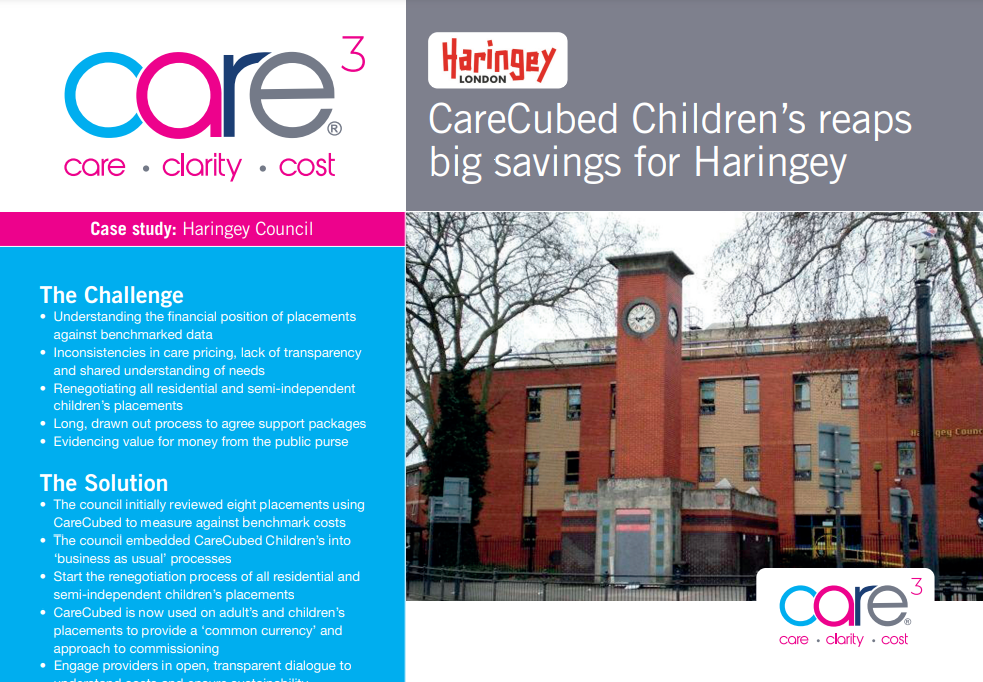
The Challenge
- Understanding the financial position of placements against benchmarked data
- Inconsistencies in care pricing, lack of transparency and shared understanding of needs
- Renegotiating all residential and semi-independent children’s placements
- Long, drawn out process to agree support packages
- Evidencing value for money from the public purse
The Solution
- The council initially reviewed eight placements using CareCubed to measure against benchmark costs
- The council embedded CareCubed Children’s into ‘business as usual’ processes
- Start the renegotiation process of all residential and semi-independent children’s placements
- CareCubed is now used on adult’s and children’s placements to provide a ‘common currency’ and approach to commissioning
- Engage providers in open, transparent dialogue to understand costs and ensure sustainability
- Management information and reports to measure effectiveness of commissioning processes and value for money
Results
- Clarity on the care required and a real focus on the individual
- In-year savings of £307k across just eight initial children’s cases
- £401k saved across the full-year equivalent on the first tranche of cases
- Impressive ongoing accumulative financial savings year-on-year
- First renegotiated case paid for the CareCubed subscription
- Deeper understanding of provider costs and improved, open, transparent relationships
The new CareCubed Children’s module saved Haringey Council £307k in the first four months of implementation across only eight cases. This represents a staggering return on investment at a time when all councils are facing unprecedented financial pressures. The authority is now renegotiating all residential and semi-independent children’s placements and embedding the tool for new cases.
Diana Sherwood is an interim at Haringey Council. She implemented CareCubed Children’s at the organisation and embedded some processes around it to enable the council to understand whether they were getting value for money and ensuring providers turn a sensible profit to continue providing vital services for residents.
The first step was to understand the current financial position of placements against benchmarked data. “First and foremost, we are committed to ensuring that our residents get the support and services they need, and CareCubed gives us a level of transparency that we didn’t have before, but ultimately allows us to focus on person-centred care with both us as commissioners and our providers having a clear, shared understanding of each placement. It was vital for us to quickly understand our current position and we could then focus our efforts on those placements where there was clearly a discrepancy that needed to be understood,” explained Sherwood. This resulted in saving £307k in-year for 20/21 and £410k for the full-year equivalent across an initial eight cases, proving CareCubed could quickly provide benefits.
“In Haringey Council, we made the decision to explore the use of CareCubed as a benchmark tool for the commissioning of our Children’s services. It has proved to be valuable to us in being able to look more closely at our placements regarding care delivered, quality and value for money. CareCubed has given us the opportunity to positively adapt our commissioning practice as well as improve budget spend as it delivered significant returns very quickly on our residential-based placements. We will continue to work collaboratively with our providers using CareCubed to ensure sustainability on current and new placements.”
Bev Hendricks,
Assistant Director, Safeguarding &
Social Care.
These savings will impact the council’s medium-term financial position too. “Had we not done this work we would have cumulatively been paying £132k more in 2023, £204k more in 2024 and by the time you got to 2025 we would have been paying £346k more. It impacts your future budgets, helping councils stay financially viable and avoid cutting other services,” she explained.
Sherwood acknowledges that not all providers will want to engage but most do because having transparency is a good thing for all involved and manages the risk and expectations placed on providers. “Providers engaging with the tool is making a huge difference to the commissioning process and, most importantly, ensures the resident gets the best possible support. We can agree ‘template’ costs with providers once rather than spend weeks or months discussing each placement, and we are able to work together on placements within a single system rather than spreadsheets and emails. It will also make uplift discussions much faster and smoother and help with the transition from child to adult care as we are using the tool consistently across both council departments.”
For providers not already using CareCubed, the council can share the information in a variety of ways. “When I do a CareCubed calculation I download it as an Excel spreadsheet or PDF document and send it to the provider to give them the opportunity to look through and see where the differences are with their breakdown of costs,” Sherwood says. “The tool compresses it all into a few pages and summarises all of the sections. One side of the spreadsheet will remain as the expected range of costs calculated by CareCubed. On the other side, providers can input their own variations so the council can look at them or ask for further details if required.”
Sherwood said implementing CareCubed was quick and easy and support was readily on hand from iESE. She believes the product is a safe “invest to save” initiative. “We were up and running with the system within two days and could immediately start to deliver the benefits. We successfully negotiated £71,000 per annum saving on the first placement in the first couple of weeks. The sooner councils start using the product, the quicker those tangible benefits are achieved,” she added.










